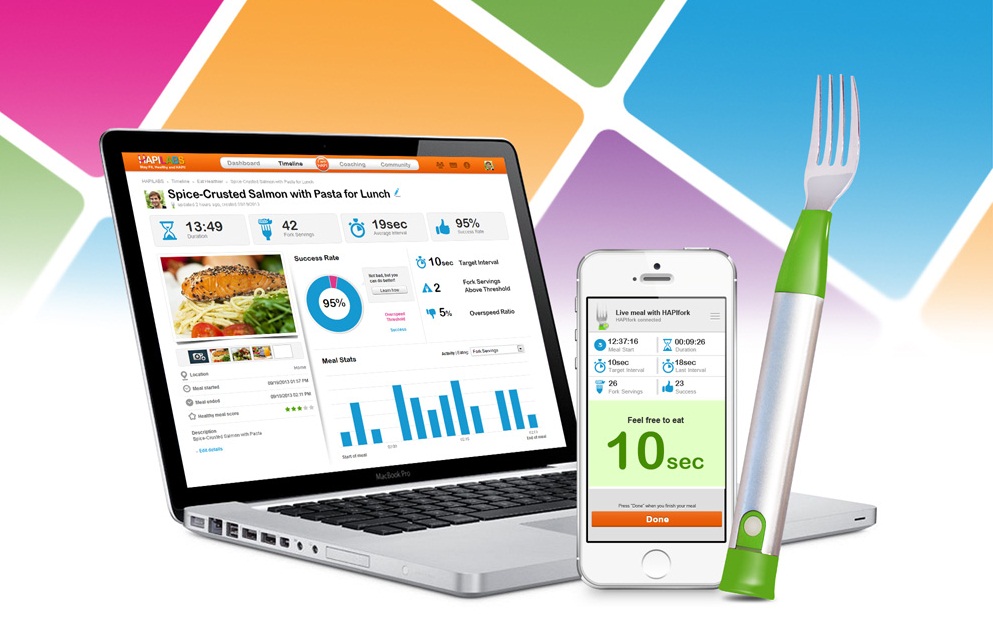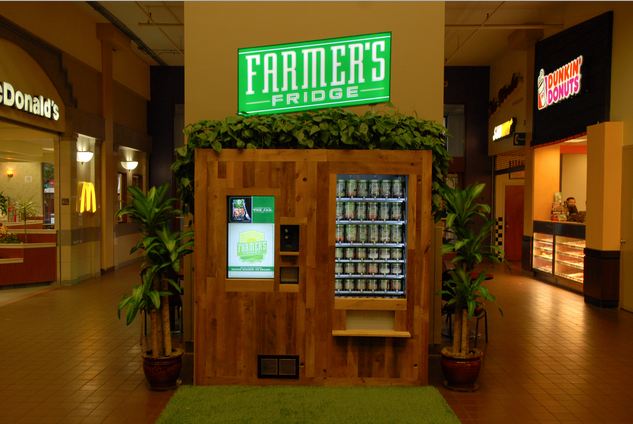And you won’t believe how awesome it is!
It’s 2014, and even though science clearly promised us jetpacks, science appears to have really dropped the ball.
But perhaps that’s a good thing. Why? Because jetpacks make you fat. Is there any more lethargy-enabling invention than the jetpack? At least the advent of the television required users to scuttle back and forth to the kitchen during commercial breaks for snacks. With a jetpack, you just zoom there. While we’re not totally sad about not having jetpacks (okay, maybe a little sad), we’re happy that science has made some other, more health-conscious advances. Here are the fitness innovations that we think will revolutionize how we get and stay healthy in the future.
A Vending Machine That Won’t Blow Your Diet
Technically it’s a kiosk, not a vending machine, but our mouths are too full of delicious salad to care about semantics.
Farmer’s Fridge is a company that stocks automated kiosks with seriously satisfying salads. It was started by Luke Saunders, a guy who was tired of eating crap while traveling for work. “I figured there had to be a way to more effectively deliver healthy food,” he says.
It works like this: Each morning the staff prepares fresh salads in an offsite kitchen space. By 10 a.m. they stock the automated kiosk, which Saunders essentially designed and built from scratch. Because the staff doesn’t actually have to work the storefront, labor costs are reduced, keeping the salads in the $7-$8 range. And what you get for $8 is pretty astonishing. Most salads combine lettuce, spinach of kale with some kind of protein—like goat cheese or quinoa or white beans—and then add on some sort of fruit and nuts.
“We try and look at the nutritional profile first and then figure out what tastes good with it,” says Saunders. “Right now we’re working on a kale Caesar salad and we’re trying to decide whether to add pomegranate seeds or apple slices to it. We’re looking at the nutrition benefits of both.”
Packaged in layers in airtight jars, Saunders says that the salads stay fresh (if refrigerated) for at least 24 hours, though he’s been known to happily eat leftovers that are three or four days old. “I eat so much salad, I probably eat more salad than anyone these days,” he admits. “But it’s good because if I start to get sick of something I know it’s time to change up our recipes.” Which, the company does regularly. Options are always changing and new salads are constantly joining the lineup. Plus Farmer’s Fridge buys locally when possible and uses organic produce for any items on the “dirty dozen list.”
Farmer’s Fridge is currently operating in Chicago, but it hopes to grow into other markets soon. If you’re not in Chicago but you want a Farmer’s Fridge salad, the company will FedEx them to your doorstep. For more info, visit www.farmersfridge.com.
A Pill That Has Everything You Need—And Nothing You Don’t
Do you really need that multivitamin you’re taking? Recent studies say you probably don’t. In fact, it could be causing you more harm than good.
But what if you could know exactly what nutrients your body needed in the exact dosage it needed them? That’s what California-based company GeneSolve is offering clients. By running a barrage of tests (53 to be exact), the company seeks to put clients’ body chemistry in balance.
“If you gave an aspirin to everyone in a theater and asked them if they felt better after the movie was over, the efficacy of the Aspirin would be statistically insignificant, because not everyone had a headache,” says Jon Orban, Founder and CEO of GeneSolve. “It’s the same with a multivitamin, you may not need everything that’s in it.”
Clients at GeneSolve sit down with a doctor (GeneSolve has a medical staff that includes MDs, PAs, RNs, but all patients have interface with a MD to oversee their program) and go over an extensive questionnaire. On it, doctors ask everything from lifestyle questions to family medical history to exposure to environmental stresses. Patients then give blood and cheek swab samples so doctors can gather data from both blood and genetic sources.
“It’s all pieces in the puzzle. You have to look at everything; all the labs and the genetic info,” says Orban. “It’s a bit like a spider web, if you move one part, the whole thing moves.”
Chris Matthews, the company’s CMO describes the testing process like this: “It’s everything you wish your doctor had time to do but doesn’t.”
Once your results are in, GeneSolve works with a custom compounding pharmacy to devise a pill—or pills—that offer you exactly what your body is lacking in your exact dosage it needs. Follow up visits are set up for three and six months out, so doctors can adjust the dosage as needed. And the company only prescribes pharmaceuticals and nutritional supplements that have evidence-based research proving their effectiveness.
In fact, GeneSolve was founded as a partnership between Orban—who has a medical and financial services background—and Dr. Richard D. Lee, a physician and professor of medicine at Stanford University. Everything the company does is based in research from peer-reviewed journals. “We’re not inventing new science. We’re using established science, but we’re putting it all together in a new way,“ says Orban. And the result, according to Orban, is that most clients report increases in mental acuity and energy and some weight loss, especially in those over the age of 35.
GeneSolve is currently taking new patients at its California and Texas locations, and it hopes to add physical locations in New York, Florida, and D.C, soon. Depending on your state’s regulations, you may also be able to consult with a GeneSolve doctor using technology like FaceTime or Skype. For more info, visit http://gene-solve.com.
Spray Tans are so 2013. In 2014 we get Spray On Clothes!
If you’ve ever arrived at the gym only to realize you forgot a key piece of workout attire, Fabrican has got you covered. Like, literally covered.
Fashion designer Manel Torres patented an idea for fabric you can spray from a can back in 2000. Fourteen years later, it’s almost ready to hit the market. Torres says that you can change the type of fabric depending on your needs—so a version with a wicking, acrylic fabric could provide that last-minute pair of socks or the shirt you need. It sticks to skin as it’s being sprayed, so you do end up with a very snug fit. And when you’re done working out, just take it off like you would a regular shirt or pair of shorts. According to Torres, you can actually reuse it too!
Fabrican is still not available to the general public, but it is designer Torres’s hope to have it out soon. For more info, visit www.fabricanltd.com.
Fitness Free For All
Not only is America facing an income gap, but it’s also facing a fitness gap. A 2010 U.S. Census Bureau report found that those living in the most poverty dense counties were the most likely to suffer from obesity. Better and affordable access to healthy options is truly needed nationwide.
Luckily the National Fitness Campaign is seeking to do exactly that. It’s designed a “Fitness Court” that has a similarly sized footprint of a basketball court and offers a variety of exercises for a total body workout. Each piece of equipment has been positioned with care, so that many people can workout in the space at once. In addition, the equipment is built to be durable and hard to pilfer. For those that need guidance, there are a series of seven-minute-long workouts available on the National Fitness Campaign’s website and the group hopes to start up court-based community fitness classes.
You can see exactly what the courts look like by visiting the National Fitness Campaign’s website here. Right now, courts are scattered in a few locations around the country, but the group hopes to install more than 1,000 new courts in the coming years.
Stick A Fork In It (But Slowly)
 We all know we’re supposed to eat slowly and carefully, chewing thoroughly and reflecting on our fullness level with each bite. But put a large rib eye steak in front of us its hard not to just let our inner carnivore rip.
We all know we’re supposed to eat slowly and carefully, chewing thoroughly and reflecting on our fullness level with each bite. But put a large rib eye steak in front of us its hard not to just let our inner carnivore rip.
Enter the HAPIfork, a Bluetooth enabled fork that uses an accelerometer to keep tabs on how quickly you’re eating. If you’re taking too many bites too quickly, it vibrates, warning you to slow down. You do have to use a special stabbing motion with the fork, so it’s maybe not the kind of thing you want to use in public, but it could be helpful for timing bites at home. Of course, the $100 price tag is a little hard to swallow.
The HAPIfork is dishwasher safe (after removing the Bluetooth insert) and sends data on the speed of your bites to your phone. It’s available at Brookstone.




